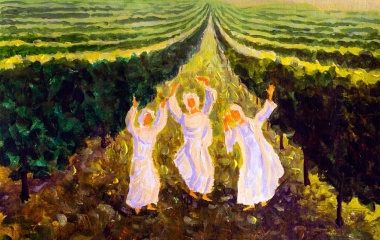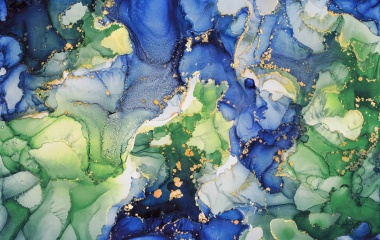
One of the best-known wedding customs is the breaking of a glass during the chuppah. The common explanation given for this custom is that it serves as a reminder of the destruction of the Temple. Our breaking of the glass is meant as a fulfilment of the verse, “If I forget you, O Jerusalem, let my right hand be forgotten; let my tongue stick to my palate if I do not mention you, if I do not raise Jerusalem above my highest joy” (Tehillim 137:5-6).
A closer examination of the source of this custom calls into question this explanation. The Talmud (Brachot 30b-31a) relates that Mar, the son of Ravina, made a wedding for his son. When he saw that the rabbis “were becoming too joyful,” he took “a valuable cup worth four hundred zuz and broke it before them, and they became sad.” To demonstrate that this was not a silly idea, the Gemara immediately follows by telling us that “Rav Ashi made a wedding for his son and saw the Sages, were excessively joyous. He brought a cup of white glass and broke it before them, and they became sad”. It is interesting to note that neither Mar nor Rav Ashi were concerned about bal tashchit, unnecessary wastage. Bal tashchit is violated when we destroy something for no reason. But to destroy for a constructive purpose is not destruction at all. To break something physical which is here today and gone tomorrow so as to gain something spiritual is well worth the price.
As to why these Sages specifically broke a glass, the Maharsha explains that glass is made from the earth, and breaking the glass reminds us that retuning to the earth is the fate of all man. “For you are dust, and to dust you will return” (Breishit 3:19). Yet at the same time, the Petach Einayim notes that broken glass can be recreated and put back together, symbolizing that man, after death, can be recreated in the World to Come.
When a vessel that has become tameh, impure, is broken and put back together, it returns to its state of original purity. As we go through life, we act in ways that make us impure—“there is no righteous person who does not sin” (Kohelet 7:20). Yet death can purify us, enabling one to enter the World to Come with a clean, pure state. Presumably, this is why Rav Ashi broke a glass that was white, the symbol of purity.
Ironically, a wedding is a most appropriate time to think about the end of life and the transition to the next world. One reason for marriage is to perpetuate the human species, to ensure that we live on even after we have passed from this world. We all will die, but we live on through our progeny. We break the glass specifically at a wedding as we begin the process of creating a new generation to replace our own.[1]
While this all may sound very sad, it is actually uplifting. That we are going to die is a given. That we can live on after we die is not. Creating a family is one of the ways that we can achieve immortality. And that is something to celebrate. Hence the custom in the Diaspora to break the glass as the last ritual of the wedding ceremony, followed by a chorus of Mazal-Tovs. Breaking the glass is an occasion for celebration, not sorrow.
But we need not look so far ahead at the wedding. Our tradition teaches that our sins are forgiven when we marry. The day of our wedding is akin to Yom Kippur, the most joyous day of the year. On this day we become a changed person, literally becoming half of a greater whole. Many have the custom to fast and recite the al chets that are recited on Yom Kippur on this special day of personal atonement.
The connection between forgiveness, Yom Kippur and marriage is highlighted by the Talmudic tradition (Taanit 26b) that on Tu B'Av and Yom Kippur day, young, single men and women would meet out in the fields to find a life’s partner. "Rabban Shimon ben Gamliel said: There were no days as joyous for the Jewish people as the fifteenth of Av and as Yom Kippur, as on them the daughters of Jerusalem would go out in white clothes...and dance in the vineyards. And what would they say? Young man, please lift up your eyes and see who to choose for yourself.” Is it any wonder the marriage ceremony is known as kiddushin, holiness?”
What may be striking to many of us is that this entire discussion has nothing to do with the loss of the Temple, exile or the duty to “place Jerusalem above all our joys.” It is a discussion about life itself, and despite its sobering context, the message is upbeat.
These wedding stories are part of the Gemara’s discussion regarding the Mishnahic teaching that, “One should only stand and pray from an approach of kovid rosh, a heavy head, i.e. great humility. The early pious ones would wait one hour and pray, so that they would focus their hearts toward their Father in Heaven” (Brachot 30b).
Prayer, almost by definition, is concerned with chayei sha’ah, matters of this world. We pray for such things as wealth, health, forgiveness, justice, and redemption—all important, but all related to our sojourn on earth. It is specifically when we are engaged in worldly affairs that we must occasionally pause and do some long-term, i.e., eternal, planning. When people are rejoicing “too much” in this world, it is time to remind them of the next.
The Talmud lists a series of ordinances enacted to commemorate the destruction. These include leaving part of one’s home unplastered, not wearing all of one’s jewellery, placing ashes on a groom’s head on his wedding day, and refraining from playing a musical instrument—or even singing—while drinking wine (unless it is a seudat mitzvah). No mention is made of breaking a glass at a wedding. It is the RaMah in his glosses to the Shulchan Aruch who mentions that “there are some places where the custom is to break a glass during the wedding ceremony, or placing a black cloth or other such items of mourning on the head of the groom” (Orach Chaim 560:2).
Unlike in the Diaspora, it is customary in Israel to break the glass in the middle of the ceremony. Following the tradition of the RaMah, the breaking of the glass is seen as a zecher leMikdash, a reminder to the destruction of the Temple. There are no mazal tovs for this sad reminder.
There is no more joyous time than a wedding. Hence the Talmud (Brachot 31a) tells us that the vast majority of the Sages were “greatly rejoicing.” It was only Mar the son of Ravina and Rav Ashi who broke a glass to tone down the celebrations. We look forward to the day of redemption, when “our mouths fill with laughter and our lips with song” (Tehillim 126:2). When? At the time that “they will say among nations, the Lord has done great things with these”. May that day come soon.
[1] G-d promises that He will give those who cannot have children, but who keep Shabbat and hold fast to the covenant, “a monument and a name better than sons or daughters. I will give them yad vashem, an everlasting name which shall not perish” (Yishayahu 56:5). It is this verse which most appropriately serves as the name for the memorial to the victims of the Holocaust.



